Ask the Developer Vol. 12, Emio – The Smiling Man: Famicom Detective Club – Chapter 3
29 August 2024
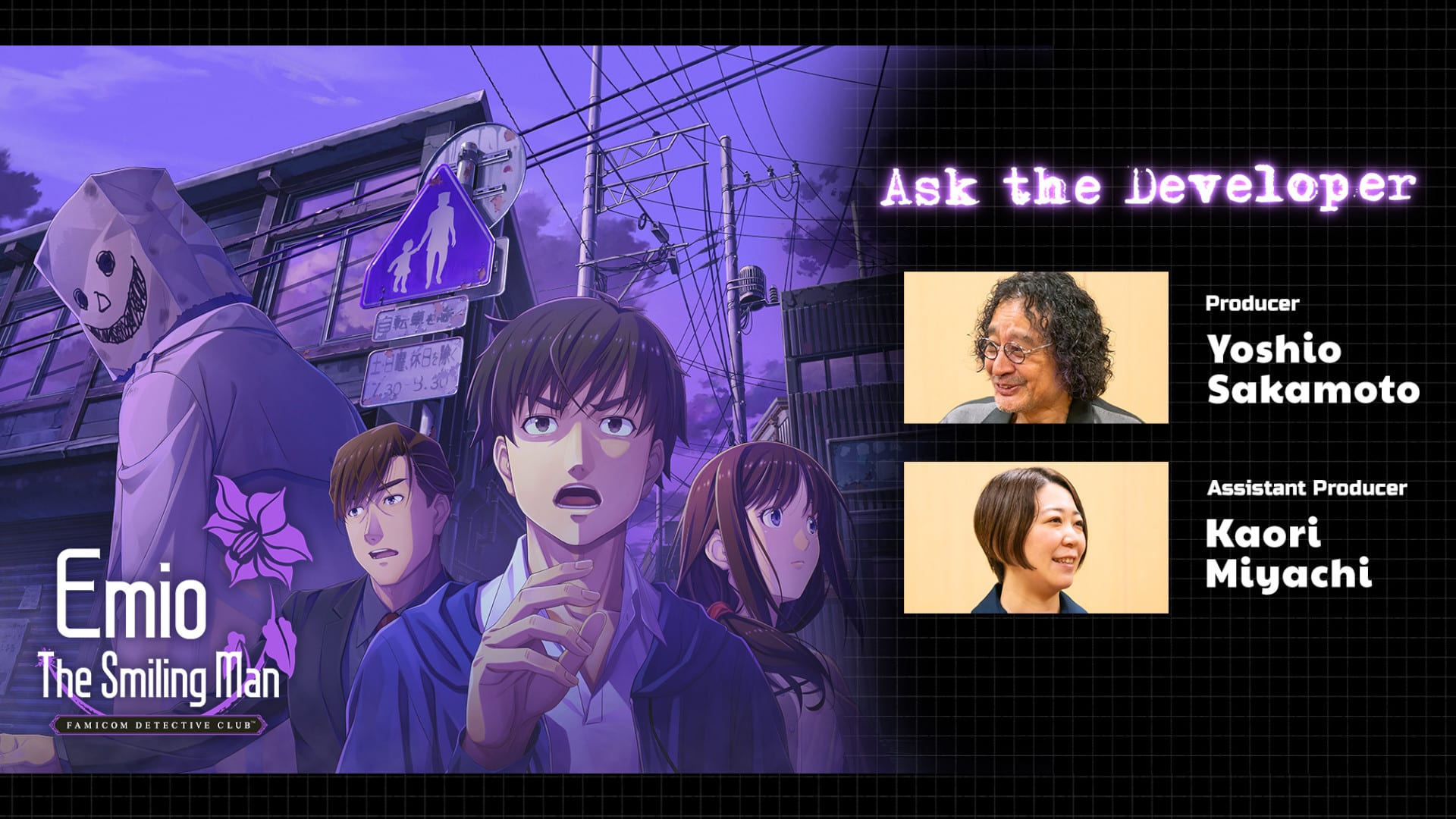
Some of the images and videos shown in text were created during development.
This article has been translated from the original Japanese content.
Chapter 3: New approach, new atmosphere
Chapter 3: New approach, new atmosphere
What other elements, besides the story, are essential when developing an adventure game?
Sakamoto:
The first essential step is to create what we call the "logic," in other words, the gameplay mechanism that makes the story work as a game.
How is this "logic" created?
Miyachi:
We used spreadsheet software. Using multiple spreadsheets, we organised things like which background is displayed in each scene, which music is playing at any given moment, and which scene to jump to if certain conditions are met.
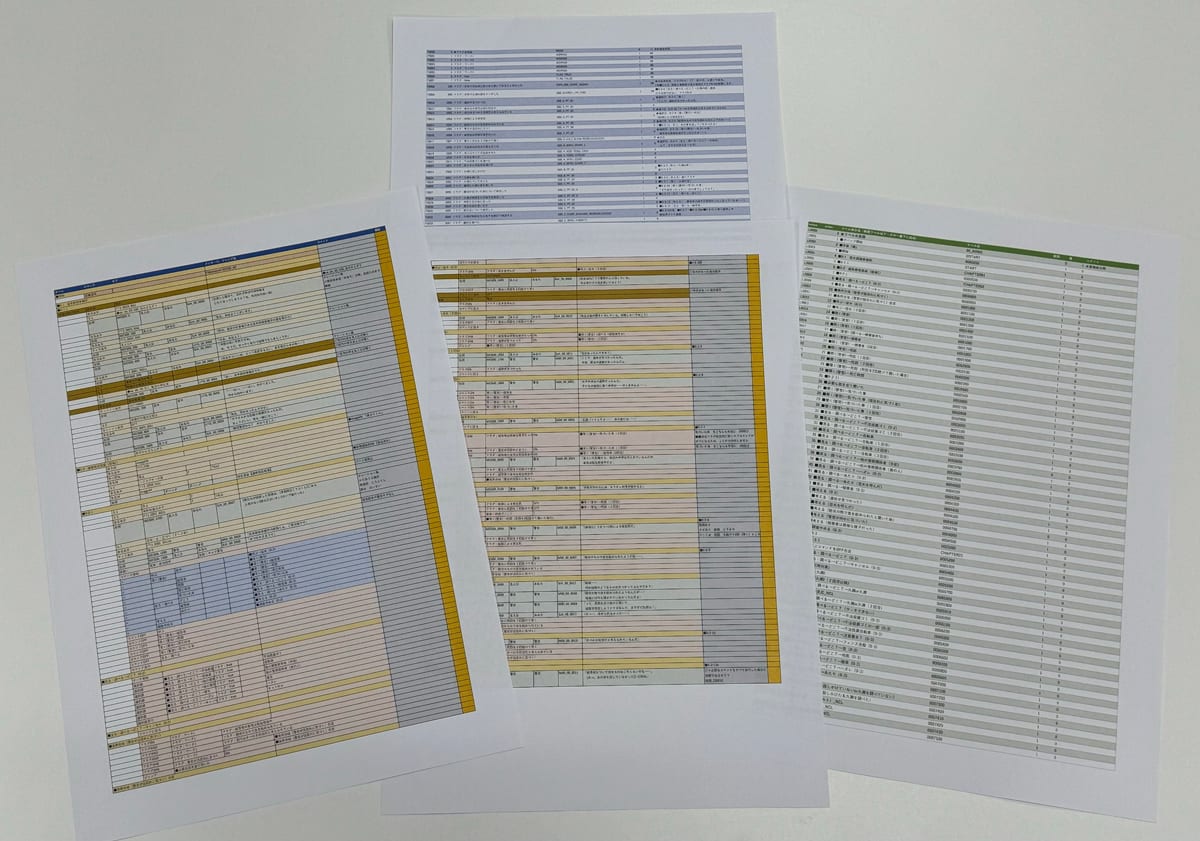
Sakamoto:
We also used those spreadsheets to manage gameplay progression. Then, we loaded them into a tool like this and ran it. Building the logic so that nothing would break was... a painstaking task. (Laughs)
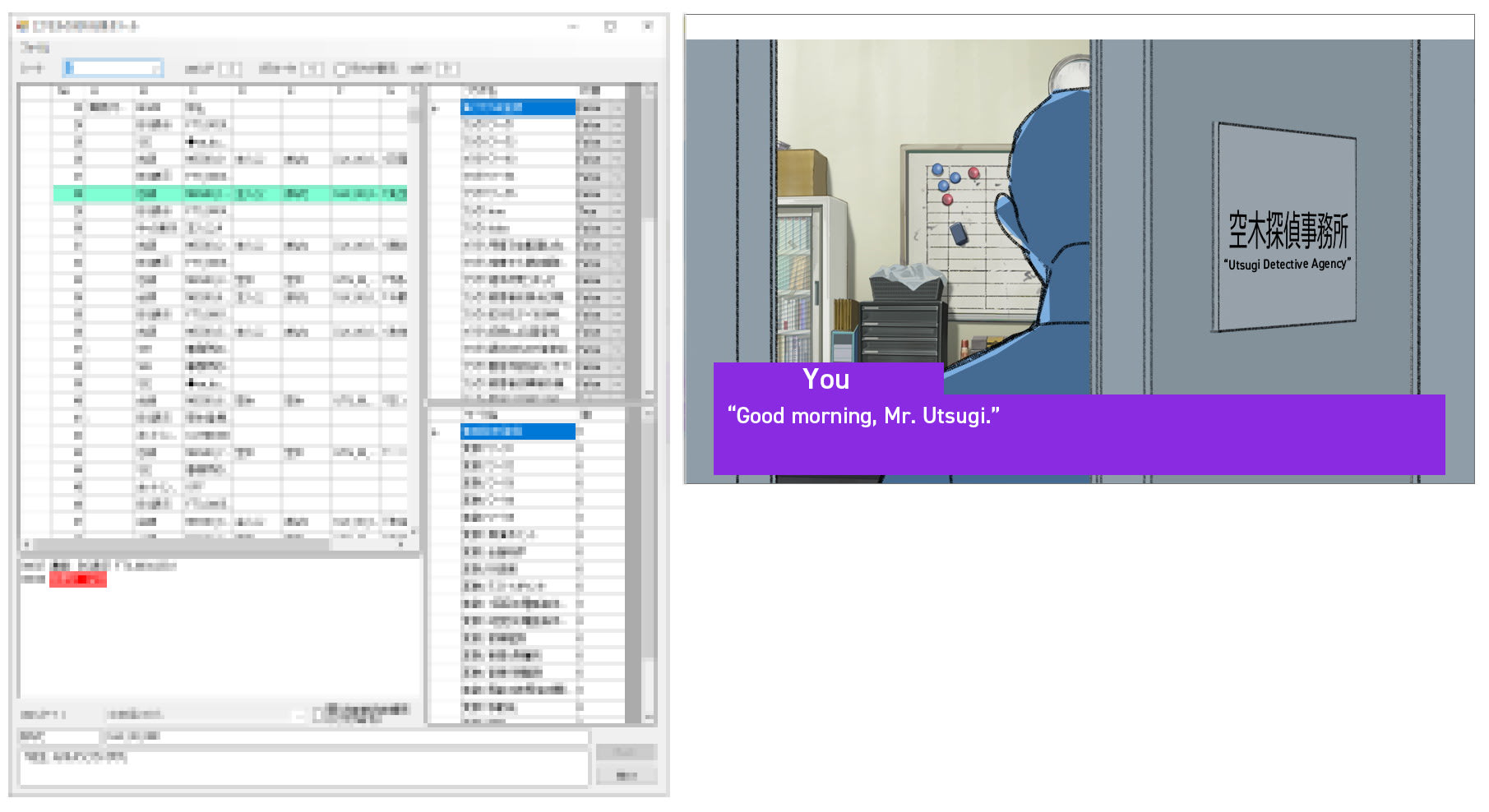
These documents go into a lot of detail.
Miyachi:
Even a slight error in the file could send the story to completely the wrong place, and sometimes, I was left wondering where I'd made a mistake.
Sakamoto:
During the development of Famicom Detective Club PART II: The Girl Who Stands Behind for Super Famicom, I used different tools and built all the logic myself. This time, I had Miyachi-san go through the logic with a fine-tooth comb and then made corrections.
Miyachi:
Sakamoto-san was excited to show me what he'd made, smugly declaring, "I'm the only one who can create the logic for this series – check this out!" But when I actually tried it, it wasn't much fun. (Laughs)
Everyone:
(Laughs)
Miyachi:
Of course, the logic was well-organised, so the story made sense. But I felt that it was lacking a sense of accomplishment. As I was pondering how to break the news to Sakamoto-san, he told me, "You can be honest." So I gave it to him straight, "It wasn't much fun."
Sakamoto:
I was flabbergasted. (Laughs) It's been a habit of mine, since my days of working on the logic single-handedly, not to make it too easy to solve. So I end up making it too difficult. But then I realised that it's not much fun if you can't solve it. I want players to feel a sense of achievement when they solve a puzzle, but I shouldn't make it so difficult that they can't begin to imagine how to solve it. It was a real challenge to maintain just the right balance throughout the game.
Also, the previous Famicom Detective Club games only used text and had no voice acting. So, if I was worried that players wouldn't understand something because certain words were missing, I could just add them in and change the logic at the last minute. But for this game, the voice recording was done early on, so we couldn't make late changes or additions. We had to do quite a bit of planning in advance.
This is the first entirely new game in the series in about 35 years, so there was a new challenge for you in terms of how you created it.
Sakamoto:
Yes. The way I approached development was brand new and different from what I've done in the past.
From a gameplay perspective, have you reworked anything, or tackled anything new?
Miyachi:
In command-based adventure games like Famicom Detective Club, when you get stuck, you tend to resort to brute force, trying out all the commands from top to bottom. When this happens, players who were immersed in the game world up until that point can become disengaged or lose track of the story. As we didn't want that to be the case in this game, we highlighted certain words that would give players hints in a different colour to help them progress through the story.
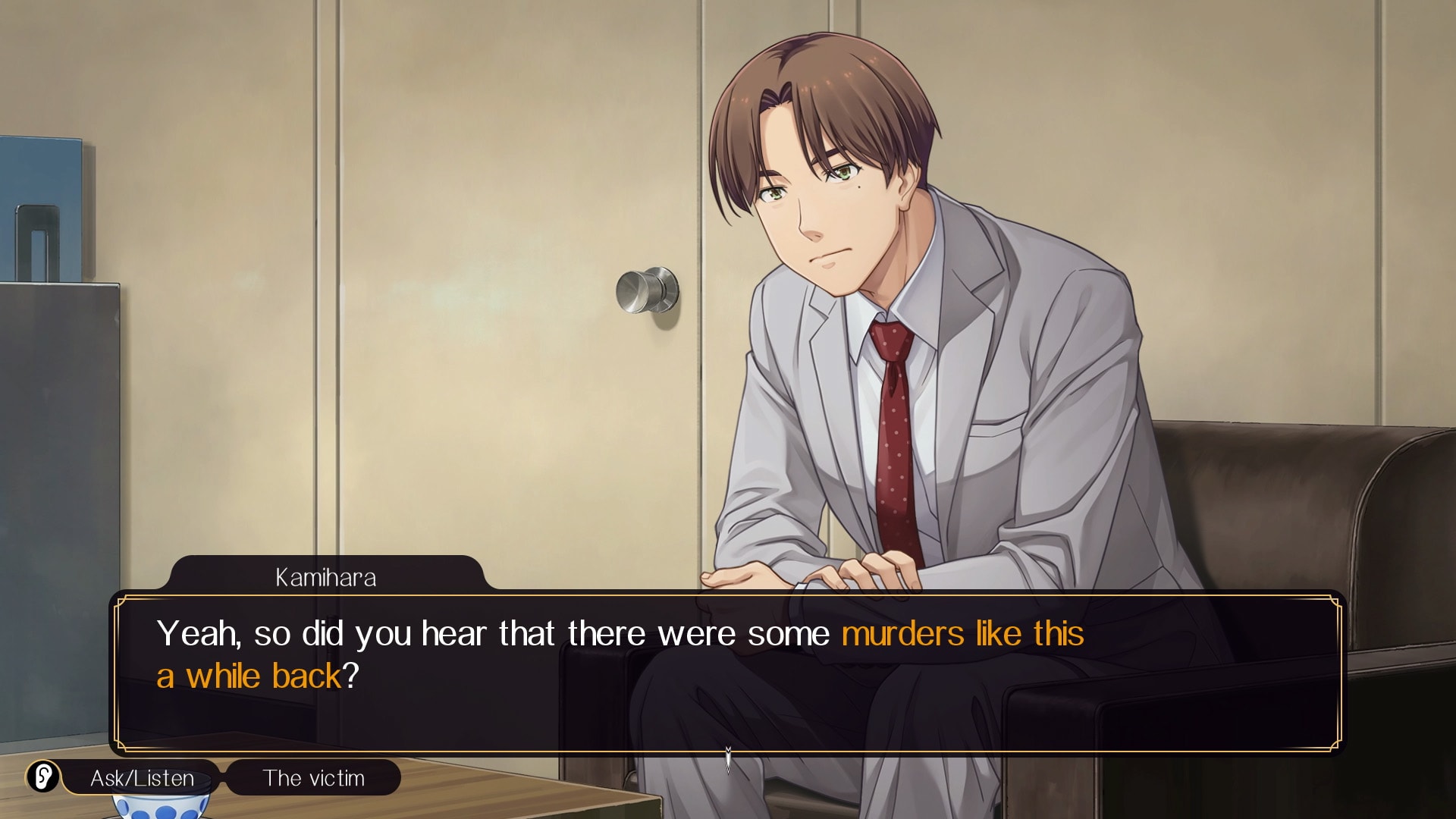
So if you look at the hints, you can figure out what to do next.
Miyachi:
Exactly. We also paid close attention to how conversations were phrased so that players could understand what was happening even if the words were not emphasised. That said, some people might think that too many hints take away some of the fun of a traditional command-based adventure game. So we included the option to turn off the highlights.
I see cell phones are another new in-game element. The fact they're old-fashioned flip phones, as opposed to smartphones, gave me a sense of the time period.
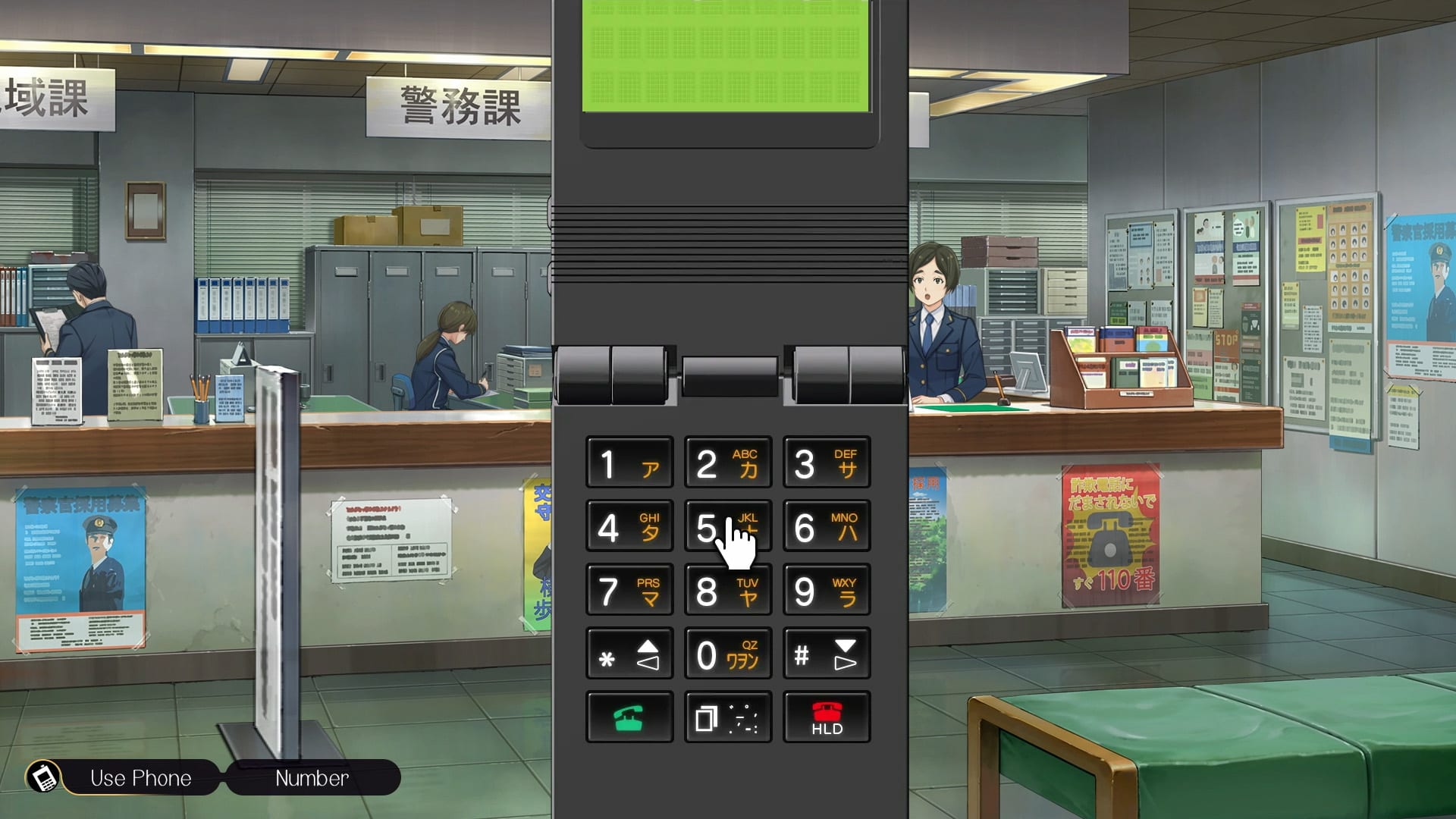
Miyachi:
We wanted to centre the story around the three members of the Utsugi Detective Agency: Shunsuke Utsugi, the protagonist, and Ayumi Tachibana. Since it was hard to imagine what that world would be like decades after the previous game, we decided to set this game in a time that retains the feel of the original games.
Also, as we were discussing how we wanted to add new elements, we started wondering what year cell phones began to be more common in Japan. We decided to go for an era when life was neither too convenient, nor too inconvenient. Do you remember that, Sakamoto-san?
Sakamoto:
Oh, I remember alright. (Laughs) It was the late '80s when we made the original Famicom Detective Club games. Back then, life in Japan was steadily becoming more convenient, although we still had our share of frustrations, so we felt that cell phones, rather than smartphones, would best fit the story.
Miyachi:
You can make phone calls during various scenes in this game. In general, you can't make a phone call when you're talking to someone face-to-face – that would be rude! But by calling up a character when you don't really need to, you may get to see an unexpected side of them.
So the logic accounts for every little detail. Also, this game seems to include a lot of elements that are new to Famicom Detective Club. Sakamoto-san, you mentioned earlier that you wanted it to be enjoyed by a wider audience.
Sakamoto:
That's right. This time, we really wanted to make the game enjoyable not only for Famicom Detective Club fans, but also for new players. With that in mind, we wanted to change the atmosphere from previous games and make it more colourful.
Colourful?
Sakamoto:
For better or worse, the previous games had an unrefined, gloomy atmosphere. That's part of Famicom Detective Club's charm, but for this title, we wanted a more colourful, vibrant feel. Famicom Detective Club games have always used humour to break up the sense of dread.
That said, we still felt there was something heavy or gloomy lingering around them. Of course, that's always been our aim, and that hasn't changed in this game. However, we wanted to change the atmosphere in this game to make it less oppressive and more refined.
We achieved this in the end, thanks to Miyachi-san's contributions. I believe that Famicom Detective Club's "sunnier" side has been enhanced in a good way.
Miyachi:
Speaking of jokes, we had to explain the meaning of this really lame Japanese pun to the overseas localisation teams, which was... a little embarrassing. (Laughs) Once we'd explained the meaning, they got it and suggested changes to make it work for players outside Japan. So, no matter which language you play in, you'll get to see some funny jokes. (Laughs)
Sakamoto:
You mentioned localisation, but regardless of which language you play it in, I think some things are universally understood. For example, the subtle changes in characters' emotions or small details presented in the game. I hope players enjoy those aspects as well.
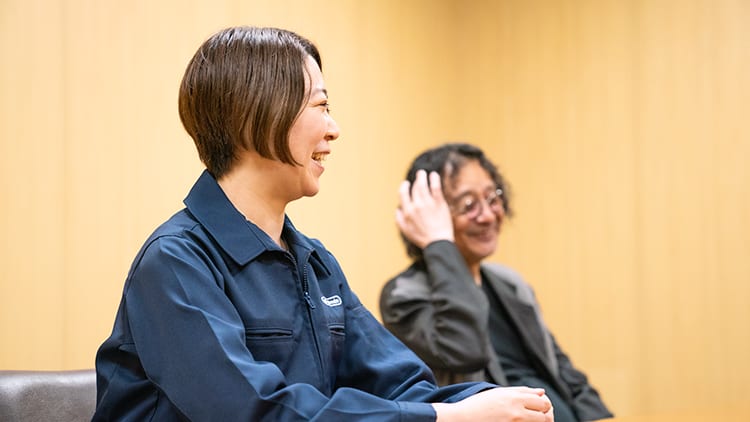
By the way, I heard you kept the key term “interactive drama” front of mind during development. Is this related to what we discussed earlier about changing the game's atmosphere?
Sakamoto:
In terms of genre, it's an adventure game, but based on what you do, it doesn’t simply fit into the scope of what a game is. And since simply calling it a game didn't feel right, I thought it would be a good idea to give it its own genre – “interactive drama.”
Miyachi:
Like an actual drama, the storyline is the same for everyone... But we wanted players to feel as though they're the ones in that story talking to the characters in front of them. So, we discussed how “interactive drama” makes sense, since players' feelings affect the actions they take, and those actions influence the responses they get.
So it’s as if you’re stepping into the drama, taking on the role of the main character. Come to think of it, it does feel like it has some connection to the RPGs that you said you like, Miyachi-san.
Miyachi:
That might well be true.
Just the other day, Sakamoto-san and I were talking about how conversations are like living things. They grow in unexpected ways, depending on your exact word choice at any given moment. There are stories scattered throughout this game that can only be heard at specific times. The same is true of real life, right?
There are lines you won't hear and things you won't come into contact with if you’re just playing through the game as fast as possible. So I encourage players to try out lots of different things and ask themselves, “If I ask this question right this moment, what kind of response will I get?” or, “What would happen if I looked into this now?”
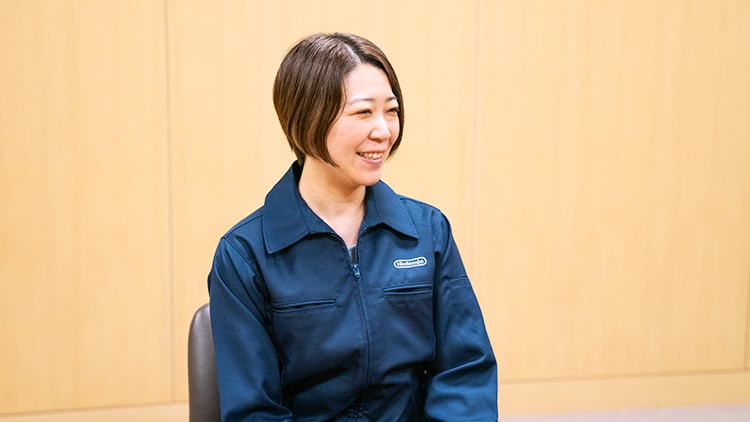
Sakamoto:
I can’t get into specifics due to spoilers, but this game incorporates elements you won't have seen very often in other games, let alone in the Famicom Detective Club series up to now, so I hope everyone enjoys it to the end. Also, each and every scene, down to a simple flashback, was produced with such extraordinary attention to detail that I think MAGES. ended up with around twice the workload they were expecting.
They handled it with a lot of perseverance, so I'm truly grateful for their support.
Here comes my last question. What's one thing you'd like to say to players looking forward to this new entry in the Famicom Detective Club series?
Sakamoto:
To all fans of the series, and to everyone who got into Famicom Detective Club through the remakes, thank you very much for waiting. First and foremost, we'd like everyone to enjoy this new Famicom Detective Club game with its fresh storyline and gameplay. But we also hope you'll enjoy the same old Famicom Detective Club style of human drama tinged with horror, unfolding through our carefully thought-out directions.
We've made a demo for this game, which includes a fair amount of gameplay, so if you’re new to the series, I recommend you give that a try. The demo contains just enough to make you want to know the whole story!
Miyachi:
Lots of Famicom Detective Club players pay close attention to every detail and notice things we've secretly planted in the game. When it comes to packing in lots of Easter eggs, this title is no exception, so we hope players will enjoy playing through it multiple times.
The two of us wrote the story and should know the game's contents inside out, but even so, during our multiple test playthroughs, we often came out with things like, “Oh, so those two things are connected! Sakamoto-san, were you aware of this?” (Laughs) Every time we replay it, we discover something new.
We hope everyone will enjoy the game at their own pace, whether they're playing Famicom Detective Club for the first time or are long-time fans of the series. And it would be great if those who play the game become a little kinder to the people who are always close to them.
Sakamoto:
That’s true. I hope this game will be a reminder of that. In fact, what you just mentioned, Miyachi-san, is really a constant theme for the Famicom Detective Club series. And to hear that come out of your mouth so naturally... I know I can count on you.
Miyachi-san and I worked to create this new iteration, bouncing ideas off each other to keep developing them. So, fans of the series, rest assured. I've found the heir at last! (Laughs)
Miyachi:
I’ll do my best not to become “the missing heir.” (Laughs)

